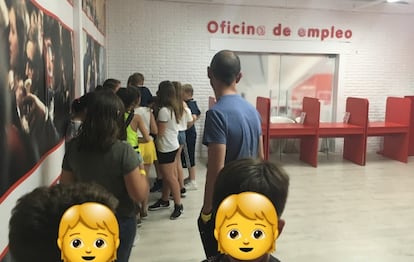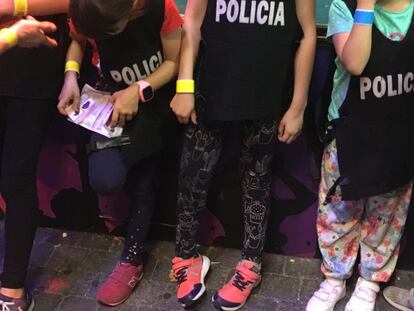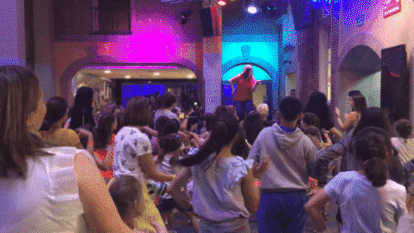Welcome to Micropolix, Madrid’s capitalist theme park for kids
In this mini-city, children play at being adults: they get jobs, open bank accounts and obssess about money

Around 20 children line up with me outside the employment office at Micropolix. They are worried: they need money for a driver’s license or to sign up to the policy academy, but they don’t have a single eurix, the official currency of this mini-city. This is Micropolix, a capitalist theme park for kids located in San Sebastián de los Reyes in Madrid, where children play at being adults: they work, drive cars, wait in line, have bank accounts and obssess about money.
Ana, my eight-year-old cousin, joins me on my visit to Micropolix, which will be closed for the summer until September. She has been my Trojan horse to visit the theme park, where adults can only enter if they are accompanied by a child.

At the ticket counter – admission fees are between €9 and €19 depending on the day and your age – Ana receives 50 eurix and a passport that accredits her as a citizen of Micropolix. I receive a brochure that explains that kids can work a number of jobs (banker, vet, store clerk) in 15 to 30-minute periods, for which they earn 30 eurix. They can spend the money in training – to be a doctor, a police officer, or getting a driver’s license – or they can save it in the bank. “Kids become adults for a day. They will experience everyday situations of real adult life through play,” Micropolix explains on their webpage.
Adults can only hold some of the jobs, and with some exceptions, they are always spectators. Or “tourists” as they are called here. Luckily, property speculation doesn’t exist in this mini-city and no child tries to rent me an Airbnb. But what does exist are social classes: those who have come to Micropolix before and have eurix they’ve saved, and those who are first-timers. Ana came a few months ago and with 200 eurix in the bank she is now part of the nouveau riche.
On the set, children can be part of the film crew, technicians, contestants presenters
But she wants more, which is why we are waiting in the line at the employment office. It’s not compulsory to go, but you get 30 eurix more if you do a job that is assigned to you. Ana is tasked with working at the television studio, which recreates the set of a game show, where the kids work as the film crew, play the host or, in the case of my cousin, act as contestants.
Micropolix also has its very own wallet, which costs €3.50 (they don’t accept eurix, I tried) and is wrapped around the waist like a fanny pack, which adds to the feeling of being in a trap video clip.

As well as worrying about money, the kids also have to be time-conscious. The door of each workplace announces the time it opens and its capacity, between 10 and 30 children. If you arrive late, you are left out and do not earn any eurix. Everyone wants to be friends with the kid with the watch, like Álvaro who has 400 eurix and tells us “if you don’t want to wait in line, you can ask someone to do it for you for 10 or 20 eurix.”
In Micropolix, there are scams and shady practices. We saw some kids who, after working a job for just a few minutes, claimed they had to go, that their parents were waiting for them, only to cross paths with them at another workplace. We also heard of police fining kids 20 eurix for running or not having their passport with them. But when it was Ana’s turn to be a police officer, there was no mention of fines. The role was to serve and protect.

As a police officer, Ana was part of a security cordon for a show in the central square of the mini-city. When the music ended, a kid on the second floor started to throw eurix in the air. There was a moment of chaos when the children, even the ones acting as police officers, ignored the adults and rushed to pick up the money.
For a few hours Micropolix turns kids into fierce, self-made entrepreneurs. But between the boasts and the rush to get to work on time, a seed for a young Bolshevik has perhaps been planted.
English version by Melissa Kitson.
Tu suscripción se está usando en otro dispositivo
¿Quieres añadir otro usuario a tu suscripción?
Si continúas leyendo en este dispositivo, no se podrá leer en el otro.
FlechaTu suscripción se está usando en otro dispositivo y solo puedes acceder a EL PAÍS desde un dispositivo a la vez.
Si quieres compartir tu cuenta, cambia tu suscripción a la modalidad Premium, así podrás añadir otro usuario. Cada uno accederá con su propia cuenta de email, lo que os permitirá personalizar vuestra experiencia en EL PAÍS.
¿Tienes una suscripción de empresa? Accede aquí para contratar más cuentas.
En el caso de no saber quién está usando tu cuenta, te recomendamos cambiar tu contraseña aquí.
Si decides continuar compartiendo tu cuenta, este mensaje se mostrará en tu dispositivo y en el de la otra persona que está usando tu cuenta de forma indefinida, afectando a tu experiencia de lectura. Puedes consultar aquí los términos y condiciones de la suscripción digital.









































